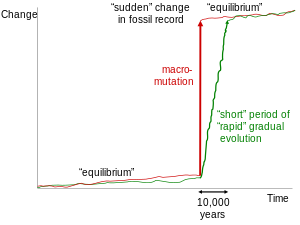
Back Gradualisme filètic Catalan تدریجگرایی تباری Persian Gradualismo filético Galician הדרגתיות פילטית HE Gradualisme filetik ID Gradualismo filetico Italian Fyletisch gradualisme Dutch Isprekidana ravnoteža Serbo-Croatian


| Part of a series on |
| Evolutionary biology |
|---|
 |
Phyletic gradualism is a model of evolution which theorizes that most speciation is slow, uniform and gradual.[1] When evolution occurs in this mode, it is usually by the steady transformation of a whole species into a new one (through a process called anagenesis). In this view no clear line of demarcation exists between an ancestral species and a descendant species, unless splitting occurs. The theory is contrasted with punctuated equilibrium.
- ^ Eldredge, N. and S. J. Gould (1972). "Punctuated equilibria: an alternative to phyletic gradualism" In T.J.M. Schopf, ed., Models in Paleobiology. San Francisco: Freeman Cooper. p. 84.